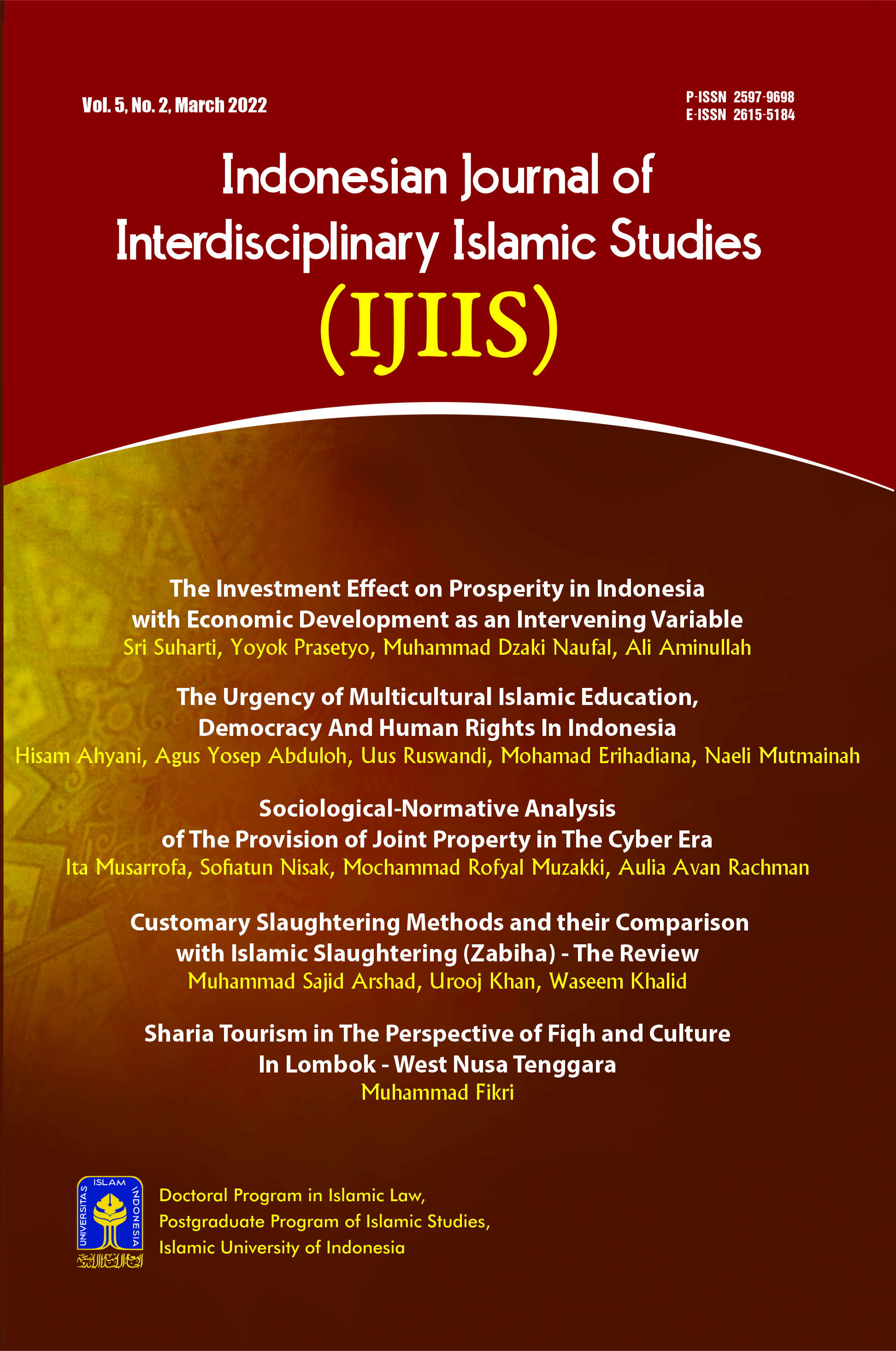Main Article Content
Abstract
Shari'a tourism is a trend in Indonesia and the international world because currently Muslim and non-Muslim countries are competing to offer the concept of shari'a tourism. The shari'a tourism discourse still attracts controversy amid society in terms of its legal aspects, concept, and application. The term shari'a tourism is also still being debated because people cannot distinguish between conventional tourism and shari'a tourism and there are differences in narratives such as halal tourism and religious tourism. In addition, the development of shari'a tourism policies in Indonesia also has governance problems. This happens because there is no strong ontological, epistemological, and axiological foundation based on Pancasila values, culture, and local wisdom. The problem that will be answered in this article is how is the Fiqh of Indonesian Tourism (FIT) used as a policy system and strategy for developing shari’a tourism. This research is a literature review using a qualitative method that is descriptive-analytic, through Habermas' critical theory approach. This critical theory paradigm is used as a way of looking at and critiquing previous thoughts such as conventional tourism and shari'a tourism. The findings of this study are the Fiqh of Indonesian Tourism (FIT) which is constructed based on Pancasila values and has an ontological, epistemological, and axiological bases, as well as the results of ijtihad through the maslahah mursalah approach as the basis for legal istinbath, 'urf as a study of law and Islamic legal (fiqhiyyah) rules as a reinforcement of the law. The Fiqh of Indonesian Tourism (FIT) is offered as a consideration in the formulation of government policies and praxis for tourist actors without having to be contaminated by non-Muslim tourists, but Muslim and non-Muslim tourists remain in harmony in carrying out tourism activities and maintaining the existence of local culture and wisdom based on Pancasila values. The Fiqh of Indonesian Tourism (FIT) is also a way of traveling without having to be trapped by the symbol of shari'a tourism, in which tourists, both Muslim and non-Muslim, can still enjoy travel and tourism amenities according to their respective beliefs.
Keywords
Article Details

This work is licensed under a Creative Commons Attribution-ShareAlike 4.0 International License.
References
- Al Asqalani, I. H. (t.t.). Fathul Baari (Vol. 53).
- Al Asqalani, I. H. (2001). Fathul bari: Syarah Shahih Al-Bukhari. Maktabah Malik Fahd. https://opac.perpusnas.go.id/DetailOpac.aspx?id=1194078
- Al Lahajji, A. (1410H). Idah al Qawid Al Fiqhiyah. Maktabah Al Hidayah.
- Al-Mahally, I. J. (1990). Tafsir jalalain. Sinar Baru Algensindo.
- Al-Qaradhawi, D. Y. (2013). 7 Kaidah Utama Fikih Muamalat. Pustaka Al-Kautsar.
- Baihaqi, M. (2019b). Wisata Halal di Gili Trawangan Lombok Utara. J-EBIS (Jurnal Ekonomi Dan Bisnis Islam), 166–182. https://doi.org/10.32505/v4i2.1257
- Basarah, A. (2017). Bung Karno, Islam, dan Pancasila (Cetakan pertama). Konstitusi Press.
- Bidang Penelitian dan Pengembangan Kebijakan Kepariwisataan Kementrian Pariwisata. (2015). Kajian Pengembangan Wisata Syariah. Kementrian Pariwisata. https://sirusa.bps.go.id/sirusa/index.php/sektoral/view?kd=13771&th=2015
- Dhae, A. (t.t.). Polemik Bali Jadi Wisata Syariah Terus Bergulir. Diambil 4 Januari 2021, dari https://mediaindonesia.com/nusantara/219665/polemik-bali-jadi-wisata-syari%E2%80%99ah-terus-bergulir
- Fikih, M. (2002). Runtuhnya Teori Pembangunan dan Globalisasi. Insist Press. https://insistpress.com/katalog/runtuhnya-teori-pembangunan-dan-globalisasi/
- Keda, O. (t.t.). Gubernur NTT Tolak Label Wisata Halal Labuan Bajo—Regional Liputan6.com. Diambil 15 Desember 2022, dari https://www.liputan6.com/regional/read/3959632/gubernur-ntt-tolak-label-wisata-halal-labuan-bajo
- Leiper, N. (1990). Tourism Systems: An Interdisciplinary Perspective. Massey Univ., Dept. of Management Systems, Business Study Faculty.
- MasterCard-Crescent Rating. (2021, Agustus). Global Muslim Travel Index 2021. GMTI 2021(Juli 2021). https://www.crescentrating.com/reports/global-muslim-travel-index-2021.html
- Noviantoro, K. M., & Zurohman, A. (2020). Prospek Pariwisata Syariah (Halal Tourism): Sebuah Tantangan di Era Revolusi Industri 4.0. Equilibrium: Jurnal Ekonomi Syariah, 8(2), 275. https://doi.org/10.21043/equilibrium.v8i2.8160
- Peraturan Daerah Provinsi Nusa Tenggara Barat Nomor 2 Tahun 2016 Tentang Pariwisata Halal, Nomor 2 Tahun 2016 (2016). https://jdih.ntbprov.go.id/content/perda-no-2-tahun-2016
- Ramadhani, M. (2021). Dilema Regulasi Pariwisata Halal di Indonesia. Journal of Islamic Tourism, Halal Food, Islamic Traveling, and Creative Economy, 1(1), 89–105. https://doi.org/10.21274/ar-rehla.2021.1.1.89-105
- Rasyid, A. (2021, Januari 5). Pariwisata Syariah. Business Law. https://business-law.binus.ac.id/2015/10/08/pariwisata-syariah/
- Sarbini. (2018). Filsafat Pariwisata: Sebuah kajian filsafat praktis (Cetakan pertama). Pustaka Pelajar.
- Zaidan, A. K. (1987). Al-Wajis fi Usul Al Fiqh. Muassasah Al-Qurtubah.
References
Al Asqalani, I. H. (t.t.). Fathul Baari (Vol. 53).
Al Asqalani, I. H. (2001). Fathul bari: Syarah Shahih Al-Bukhari. Maktabah Malik Fahd. https://opac.perpusnas.go.id/DetailOpac.aspx?id=1194078
Al Lahajji, A. (1410H). Idah al Qawid Al Fiqhiyah. Maktabah Al Hidayah.
Al-Mahally, I. J. (1990). Tafsir jalalain. Sinar Baru Algensindo.
Al-Qaradhawi, D. Y. (2013). 7 Kaidah Utama Fikih Muamalat. Pustaka Al-Kautsar.
Baihaqi, M. (2019b). Wisata Halal di Gili Trawangan Lombok Utara. J-EBIS (Jurnal Ekonomi Dan Bisnis Islam), 166–182. https://doi.org/10.32505/v4i2.1257
Basarah, A. (2017). Bung Karno, Islam, dan Pancasila (Cetakan pertama). Konstitusi Press.
Bidang Penelitian dan Pengembangan Kebijakan Kepariwisataan Kementrian Pariwisata. (2015). Kajian Pengembangan Wisata Syariah. Kementrian Pariwisata. https://sirusa.bps.go.id/sirusa/index.php/sektoral/view?kd=13771&th=2015
Dhae, A. (t.t.). Polemik Bali Jadi Wisata Syariah Terus Bergulir. Diambil 4 Januari 2021, dari https://mediaindonesia.com/nusantara/219665/polemik-bali-jadi-wisata-syari%E2%80%99ah-terus-bergulir
Fikih, M. (2002). Runtuhnya Teori Pembangunan dan Globalisasi. Insist Press. https://insistpress.com/katalog/runtuhnya-teori-pembangunan-dan-globalisasi/
Keda, O. (t.t.). Gubernur NTT Tolak Label Wisata Halal Labuan Bajo—Regional Liputan6.com. Diambil 15 Desember 2022, dari https://www.liputan6.com/regional/read/3959632/gubernur-ntt-tolak-label-wisata-halal-labuan-bajo
Leiper, N. (1990). Tourism Systems: An Interdisciplinary Perspective. Massey Univ., Dept. of Management Systems, Business Study Faculty.
MasterCard-Crescent Rating. (2021, Agustus). Global Muslim Travel Index 2021. GMTI 2021(Juli 2021). https://www.crescentrating.com/reports/global-muslim-travel-index-2021.html
Noviantoro, K. M., & Zurohman, A. (2020). Prospek Pariwisata Syariah (Halal Tourism): Sebuah Tantangan di Era Revolusi Industri 4.0. Equilibrium: Jurnal Ekonomi Syariah, 8(2), 275. https://doi.org/10.21043/equilibrium.v8i2.8160
Peraturan Daerah Provinsi Nusa Tenggara Barat Nomor 2 Tahun 2016 Tentang Pariwisata Halal, Nomor 2 Tahun 2016 (2016). https://jdih.ntbprov.go.id/content/perda-no-2-tahun-2016
Ramadhani, M. (2021). Dilema Regulasi Pariwisata Halal di Indonesia. Journal of Islamic Tourism, Halal Food, Islamic Traveling, and Creative Economy, 1(1), 89–105. https://doi.org/10.21274/ar-rehla.2021.1.1.89-105
Rasyid, A. (2021, Januari 5). Pariwisata Syariah. Business Law. https://business-law.binus.ac.id/2015/10/08/pariwisata-syariah/
Sarbini. (2018). Filsafat Pariwisata: Sebuah kajian filsafat praktis (Cetakan pertama). Pustaka Pelajar.
Zaidan, A. K. (1987). Al-Wajis fi Usul Al Fiqh. Muassasah Al-Qurtubah.
